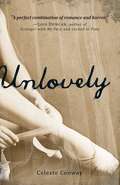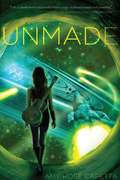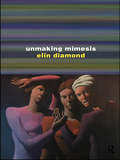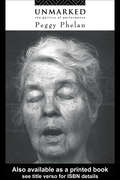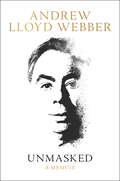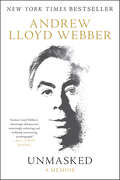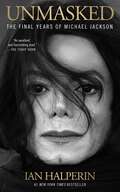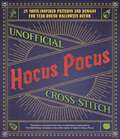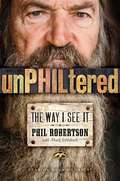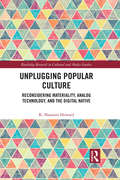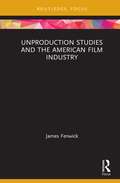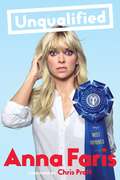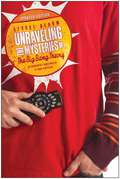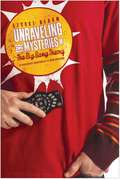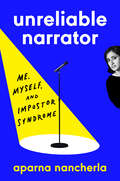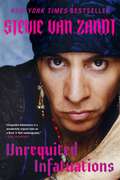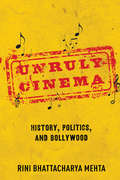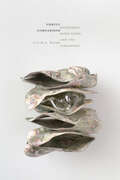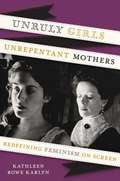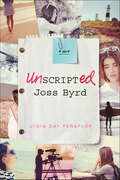- Table View
- List View
Unlovely
by Celeste ConwayThey look so sweet and beautiful...but what is the dark, unlovely truth?Harley's a college guy with a brain in his head. Those old tales about the ballet school and the evils hidden within its walls are for the town's fools and gossips. Then Cassandra, one of the dancers, whirls into his life. Harley is at first enchanted. Then he's doubtful. And then he's terrified. But it's already too late.
Unlovely
by Celeste ConwayThey look so sweet and beautiful...but what is the dark, unlovely truth?Harley's a college guy with a brain in his head. Those old tales about the ballet school and the evils hidden within its walls are for the town's fools and gossips. Then Cassandra, one of the dancers, whirls into his life. Harley is at first enchanted. Then he's doubtful. And then he's terrified. But it's already too late.
Unmade
by Amy Rose CapettaCadence is in a race against time and space to save her family and friends from the Unmakers, who are tracking the last vestiges of humanity across the cosmos. As the epic battle begins, Cade learns that letting people in also means letting them go. The universe spins out of control and Cade alone must face the music in the page-turning conclusion to Entangled.
Unmaking Mimesis: Essays on Feminism and Theatre
by Elin DiamondIn Unmaking Mimesis Elin Diamond interrogates the concept of mimesis in relation to feminism, theatre and performance. She combines psychoanalytic, semiotic and materialist strategies with readings of selected plays by writers as diverse as Ibsen, Brecht, Aphra Behn, Caryl Churchill and Peggy Shaw. Through a series of provocative readings of theatre, theory and feminist performance she demonstrates the continuing force of feminism and mimesis in critical thinking today. Unmaking Mimesis will interest theatre scholars and performance and cultural theorists, for all of whom issues of text, representation and embodiment are of compelling concern.
Unmarked: The Politics of Performance
by Peggy PhelanUnmarked is a controversial analysis of the fraught relation between political and representational visibility in contemporary culture. Written from and for the Left, Unmarked rethinks the claims of visibility politics through a feminist psychoanalytic examination of specific performance texts - including photography, painting, film, theatre and anti-abortion demonstrations.
Unmarked: The Politics of Performance
by Peggy PhelanUnmarked is a controversial analysis of the fraught relation between political and representational visibility in contemporary culture. Written from and for the Left, Unmarked rethinks the claims of visibility politics through a feminist psychoanalytic examination of specific performance texts - including photography, painting, film, theatre and anti-abortion demonstrations.
Unmasked: A Memoir
by Andrew Lloyd WebberNew York Times Bestseller: From the Broadway legend, a “charmingly idiosyncratic, surprisingly endearing and ruthlessly entertaining autobiography” (The Wall Street Journal).Andrew Lloyd Webber has reigned over the musical theatre world for half a century. Here, in his own inimitable, quirky voice, the revered composer takes stock of his achievements, the twists of fate that brought both success and disappointment, and what inspires and sustains him. He reveals his artistic influences and reminisces about his bohemian London youth and the happiest place of his childhood: his homemade Harrington Pavilion—a make-believe world of musical theatre in which he created his earliest entertainments.A record of several exciting and turbulent decades of British and American musical theatre, Unmasked is ultimately a chronicle of artistic creation. Lloyd Webber looks back at the development of some of his most famous works and his collaborations with such luminaries as Tim Rice, Robert Stigwood, Harold Prince, Cameron Mackintosh, and Trevor Nunn. He reveals fascinating details about each of his productions: the cast of characters involved with making them, the creative and logistical challenges, and the artistic political battles.He recalls writing songs for a school production that would become his first hit, Joseph and the Amazing Technicolor Dreamcoat; finding the performers for his rock opera Jesus Christ Superstar; developing his first megahit, Evita, which would win seven Tony Awards; staking his reputation and fortune on the groundbreaking Cats; and making history with the dazzling The Phantom of the Opera.Reflecting a life of many passions (from architecture to Turkish Swimming Cats), full of witty and revealing anecdotes, and featuring cameos by many celebrities—Elaine Paige, Sarah Brightman, David Frost, Julie Covington, Judi Dench, Richard Branson, A.R. Rahman, Mandy Patinkin, Patti LuPone, Richard Rodgers, Norman Jewison, Milos Forman, Plácido Domingo, Barbra Streisand, Michael Crawford, Gillian Lynne, Betty Buckley, and more—Unmasked at last reveals the true face of the extraordinary man behind the legend.
Unmasked: A Memoir
by Andrew Lloyd Webber“Unmasked will tickle music and theater geeks. It’s an insider’s inside account, highly readable, thanks to Lloyd Webber’s affable, intelligent voice.” —USA TodayOne of the most successful and distinguished artists of our time, Andrew Lloyd Webber has reigned over the musical theatre world for nearly five decades. The winner of numerous awards, including multiple Tonys and an Oscar, Lloyd Webber has enchanted millions worldwide with his music and numerous hit shows, including Jesus Christ Superstar, Evita, Cats, The Phantom of the Opera—Broadway’s longest running show—and most recently, School of Rock. In Unmasked, written in his own inimitable, quirky voice, the revered, award-winning composer takes stock of his achievements, the twists of fate and circumstance which brought him both success and disappointment, and the passions that inspire and sustain him.A record of several exciting and turbulent decades of British and American musical theatre and the transformation of popular music itself, Unmasked is ultimately a chronicle of artistic creation. Lloyd Webber looks back at the development of some of his most famous works and illuminates his collaborations with luminaries such as Tim Rice, Robert Stigwood, Harold Prince, Cameron Mackintosh, and Trevor Nunn.Reflecting a life that included many passions (from architecture to Turkish Swimming Cats), full of witty and revealing anecdotes, and featuring cameo appearances by numerous celebrities—Elaine Paige, Sarah Brightman, David Frost, Julie Covington, Judi Dench, Richard Branson, A.R. Rahman, Mandy Patinkin, Patti LuPone, Richard Rodgers, Norman Jewison, Milos Forman, Plácido Domingo, Barbra Streisand, Michael Crawford, Gillian Lynne, Betty Buckley, and more—Unmasked at last reveals the true face of the extraordinary man beneath the storied legend.
Unmasked: The Final Years of Michael Jackson
by Ian HalperinIn late December 2008, Ian Halperin told the world that Michael Jackson had only six months to live. His investigations into Jackson's failing health made headlines around the globe. Six months later, the King of Pop was dead. Whatever the final autopsy results reveal, it was greed that killed Michael Jackson. Friends and associates paint a tragic picture of the last years and days of his life as Jackson made desperate attempts to prepare for the planned concert series at London's 02 Arena in July 2009. These shows would have earned millions for the singer and his entourage, but he could never have completed them, not mentally, and not physically. Michael knew it and his advisors knew it. Anyone who caught even a fleeting glimpse of the frail old man hiding beneath the costumes and cosmetics would have understood that the London tour was madness. Why did it happen this way? After an intense five year investigation, New York Times bestselling author Ian Halperin uncovers the real story of Michael Jackson's final years, a suspenseful and surprising thriller.
Unofficial Hocus Pocus Cross-Stitch: 25 Movie-Inspired Patterns and Designs for Year-Round Halloween Decor
by Ulysses PressJoin the Sanderson sisters in some stitchcraft and brew up some '90s-inspired designs and spooky slogans with this unofficial cross-stitch book for fans of Halloween and Hocus Pocus.Unofficial Hocus Pocus Cross-Stitch brings your favorite '90s film to life with cute crafts and spooky decor. Perfect for beginners, this book has 25 witchy cross-stitch patterns that pay homage to the Halloween classic. Patterns include sayings like &“Just a Bunch of Hocus Pocus&” and &“I Put a Spell on You&” as well as fun designs like a selection of brooms (and a vacuum), gravestones, and more! Whether you&’re making Halloween decor for spooky season or one-of-a-kind handmade gifts for your witchiest friends and family, this cross-stitch book is a must-have for any wannabe Sanderson sister.
Unphiltered
by Phil RobertsonFollowing the huge success of Happy, Happy, Happy, the Number One US bestseller that has sold over 1.25 million copies, Duck Dynasty star Phil Robertson shares the principles that have shaped his career and his personal, business, political, hunting, faith and family life. In this inspirational and entertaining book, you will learn what makes Phil Robertson tick. Robertson shares his views on faith-and how it has totally changed his way of life and how he treats others; family-how he raised his kids and is raising grandkids while teaching them the life principles he lives by; ducks-and the business principles that started the Duck Commander empire; marriage-including what he's learned from his own marriage; and of course, his opinions on controversial topics like gun control, taxes, prayer in school, and the government. UnPHILtered is the ultimate guide to everything Phil Robertson believes in. Balancing his sometimes off-the-wall comments with his strong focus on home and family life, it is sure to spark discussion, laughs, and a sincere appreciation for Phil's unique approach to life.
Unplugging Popular Culture: Reconsidering Analog Technology, Materiality, and the “Digital Native" (Routledge Research in Cultural and Media Studies)
by K. Shannon HowardUnplugging Popular Culture showcases youth and young adult characters from film and television who defy the stereotype of the "digital native" who acts as an unquestioning devotee to screened technologies like the smartphone. In this study, unplugged tools, or non-digital tools, do not necessitate a ban on technology or a refusal to acknowledge its affordances but work instead to highlight the ability of fictional characters to move from high tech settings to low tech ones. By repurposing everyday materials, characters model the process of reusing and upcycling existing materials in innovative ways. In studying examples such as Pitch Perfect, Supernatural, Stranger Things, and Get Out, the book aims to make theories surrounding materiality apparent within popular culture and to help today’s readers reconsider stereotypes of the young people they encounter on a daily basis.
Unproduction Studies and the American Film Industry (Routledge Focus on Film Studies)
by James FenwickThis book makes the case for unproduction studies, the study of films left unmade, unseen, or unreleased, as a radical discipline with the potential to uncover a shadow history of the American film industry. Exploring the archival methods that can be utilised in this endeavour, James Fenwick argues that a revisionist history is needed to understand the logic of the film industry, finding that it has long-been predicated on a system of unmade creativity in which finances, resources, and labour is invested into projects that production companies know will never be produced or have no intention of ever producing. Using the Production Code Administration (PCA) records, housed at the Margaret Herrick Library, as a case study, the book explores the material existence of the unmade and considers how archives and archival methods can be used to construct a shadow history that recovers the forgotten, marginalised, and overlooked figures in film history, providing explanations for structural forces that contributed to the unmade. Given its unique use of the unmade as an analytic for film history, this book will be an essential read for scholars interested in film and media history, performance studies, film production, and creative practice, as well as to archivists and archival researchers.
Unqualified
by Anna Faris Chris PrattAnna Faris has advice for you. And it’s great advice, because she’s been through it all, and she wants to tell you what she’s learned. After surviving an awkward childhood (when she bribed the fastest boy in the third grade with ice cream), navigating dating and marriage in Hollywood, and building a podcast around romantic advice, Anna has plenty of lessons to share: Advocate for yourself. Know that there are wonderful people out there and that a great relationship is possible. And, finally, don’t date magicians.Her comic memoir, Unqualified, shares Anna’s candid, sympathetic, and entertaining stories of love lost and won. Part memoir—including stories about being “the short girl” in elementary school, finding and keeping female friends, and dealing with the pressures of the entertainment industry and parenthood—part humorous, unflinching advice from her hit podcast, Anna Faris Is Unqualified, the book will reveal Anna’s unique take on how to master the bizarre, chaotic, and ultimately rewarding world of love.Hilarious, honest, and useful, Unqualified is the book Anna’s fans have been waiting for.
Unraveling the Mysteries of The Big Bang Theory (Updated Edition): An Unabashedly Unauthorized TV Show Companion
by George BeahmREVISED, UPDATED, AND EXPANDED! The Big Bang Theory – CBS's surprise hit sitcom – was recently renewed through 2017 after pulling in 19 million weekly viewers in its most recent season. Any fan who tunes in week to week wasn't surprised. The quirky show does what so few shows manage to do: straddle the fence between cult hit and mega-popular award-winner. Now, in Unraveling the Mysteries of The Big Bang Theory, longtime sf fan and author George Beahm has put together a guide with photographs for all fans of the show – mainstream tv viewers, sf and comics fans, and science enthusiasts alike. Whether you're a Penny or a Sheldon, whether you've just tuned in or been watching all along, this companion book will help you appreciate The Big Bang Theory to the fullest. Unraveling the Mysteries of The Big Bang Theory offers a full, comprehensive look at the series: from an analysis of the awful original pilot (that viewers may never get to see) to a tour of the real Cal Tech (which serves as one of the show's main settings), from a fandom terminology guide to enlightening analyses of the endearingly original main characters, all the show's quirkiest and most appealing elements are put under the microscope. This updated edition includes a focus on the show's female characters in addition to bringing the content up to date through the show's seventh season.
Unraveling the Mysteries of The Big Bang Theory: An Unabashedly Unauthorized TV Show Companion
by George Beahm4 Science Geeks + 1 Savvy Blonde Waitress = A Big Bang You don&’t have to be a theoretical physicist to understand why The Big Bang Theory is one of the most popular shows on television. Brains meet beauty in a calculus of comedy that always adds up to smart and hilarious results. Unraveling the Mysteries of The Big Bang Theory: An Unabashedly Unauthorized TV Show Companion is a quantum leap beyond the typical TV show guidebook. Exploring every nook and cranny of the Big Bang Theory universe, it provides a wealth of information about our favorite television show: A profile of &“intelligent designers&” Chuck Lorre and Bill Prady A detailed look at what went wrong with the unaired original pilot—and what went right in the reboot In-depth background on the principal actors and the characters they play A photo-illustrated breakdown of the Sheldonian universe, from couch to cosmos (including the show locations you can visit in real life) How to get your geek on, Big Bang—style A primer on the show&’s key scientific concepts, plus its galaxy of guest star scientists A concise guide to every episode and the meaning behind each title, organized by season An A-Z guide to the pop culture miscellanea mentioned in the show And more! Pull up a seat—just not Sheldon&’s, which is in a state of eternal dibs—and get ready to unravel the mysteries of The Big Bang Theory.
Unreliable Narrator: Me, Myself, and Impostor Syndrome
by Aparna Nancherla&“A deeply honest and funny look at how exhausting it can be to live a human life, Unreliable Narrator is a book for anyone who wants to laugh and feel less alone.&”—Amy Poehler A hilarious and insightful collection of essays exploring impostor syndrome, from the inside and out, by the most successful fraud in comedyAparna Nancherla is a superstar comedian on the rise—a darling of Netflix and Comedy Central&’s comedy special lineups, a headliner at comedy shows and music festivals, a frequenter of late night television and the subject of numerous profiles. She&’s also a successful actor who has written a barrage of thoughtful essays published by the likes of the New York Times. If you ask her, though, she&’s a total fraud. She&’d hate to admit it, but no one does impostor syndrome quite like Aparna Nancherla.UNRELIABLE NARRATOR is a collection of essays that uses Aparna&’s signature humor to illuminate an interior life, one constantly bossed around by her depression (whom she calls Brenda), laced with anxiety like a horror movie full of jump-scares, and plagued by an unrepenting love-hate relationship with her career as a painfully shy standup comedian. But luckily, crippling self-doubt comes with the gift of keen self-examination. These essays deliver hilarious and incredibly insightful meditations on body image, productivity culture, the ultra-meme-ability of mental health language, and who, exactly, gets to make art &“about nothing.&” Despite her own arguments to the contrary, UNRELIABLE NARRATOR is undeniable proof that Aparna is a force—as a comedian and author alike—to be reckoned with.
Unrequited Infatuations: A Memoir
by Stevie Van Zandt'A wonderfully original take on a Rock and Roll autobiography' Paul McCartney'An inimitable Rock 'n' Roll life told as boldly as it was lived' Bruce SpringsteenWhat story begins in a bedroom in suburban New Jersey in the early '60s, unfolds on some of the country's largest stages, and then ranges across the globe, demonstrating over and over again how Rock and Roll has the power to change the world for the better? This story.The first true heartbeat of UNREQUITED INFATUATIONS is the moment when Stevie Van Zandt trades in his devotion to the Baptist religion for an obsession with Rock and Roll. Groups like the Beatles and the Rolling Stones created new ideas of community, creative risk, and principled rebellion. They changed him forever. While still a teenager, he met Bruce Springsteen, a like-minded outcast/true believer who became one of his most important friends and bandmates. As Miami Steve, Van Zandt anchored the E Street Band as they conquered the Rock and Roll world.And then, in the early '80s, Van Zandt stepped away from E Street to embark on his own odyssey. He refashioned himself as Little Steven, a political songwriter and performer, fell in love with Maureen Santoro who greatly expanded his artistic palette, and visited the world's hot spots as an artist/journalist to not just better understand them, but to help change them. Most famously, he masterminded the recording of "Sun City," an anti-apartheid anthem that sped the demise of South Africa's institutionalized racism and helped get Nelson Mandela out of prison.By the '90s, Van Zandt had lived at least two lives-one as a mainstream rocker, one as a hardcore activist. It was time for a third. David Chase invited Van Zandt to be a part of his new television show, the Sopranos-as Silvio Dante, he was the unconditionally loyal consiglieri who sat at the right hand of Tony Soprano (a relationship that oddly mirrored his real-life relationship with Bruce Springsteen).Underlying all of Van Zandt's various incarnations was a devotion to preserving the centrality of the arts, especially the endangered species of Rock. In the twenty-first century, Van Zandt founded a groundbreaking radio show (Underground Garage), a fiercely independent record label (Wicked Cool), and developed a curriculum to teach students of all ages through the medium of music history. He also rejoined the E Street Band for what has now been a twenty-year victory lap.UNREQUITED INFATUATIONS chronicles the twists and turns of Stevie Van Zandt's always surprising life. It is more than just the testimony of a globe-trotting nomad, more than the story of a groundbreaking activist, more than the odyssey of a spiritual seeker, and more than a master class in rock and roll (not to mention a dozen other crafts). It's the best book of its kind because it's the only book of its kind.
Unrequited Infatuations: A Memoir
by Stevie Van Zandt'A wonderfully original take on a Rock and Roll autobiography' Paul McCartney'An inimitable Rock 'n' Roll life told as boldly as it was lived' Bruce SpringsteenWhat story begins in a bedroom in suburban New Jersey in the early '60s, unfolds on some of the country's largest stages, and then ranges across the globe, demonstrating over and over again how Rock and Roll has the power to change the world for the better? This story.The first true heartbeat of UNREQUITED INFATUATIONS is the moment when Stevie Van Zandt trades in his devotion to the Baptist religion for an obsession with Rock and Roll. Groups like the Beatles and the Rolling Stones created new ideas of community, creative risk, and principled rebellion. They changed him forever. While still a teenager, he met Bruce Springsteen, a like-minded outcast/true believer who became one of his most important friends and bandmates. As Miami Steve, Van Zandt anchored the E Street Band as they conquered the Rock and Roll world.And then, in the early '80s, Van Zandt stepped away from E Street to embark on his own odyssey. He refashioned himself as Little Steven, a political songwriter and performer, fell in love with Maureen Santoro who greatly expanded his artistic palette, and visited the world's hot spots as an artist/journalist to not just better understand them, but to help change them. Most famously, he masterminded the recording of "Sun City," an anti-apartheid anthem that sped the demise of South Africa's institutionalized racism and helped get Nelson Mandela out of prison.By the '90s, Van Zandt had lived at least two lives-one as a mainstream rocker, one as a hardcore activist. It was time for a third. David Chase invited Van Zandt to be a part of his new television show, the Sopranos-as Silvio Dante, he was the unconditionally loyal consiglieri who sat at the right hand of Tony Soprano (a relationship that oddly mirrored his real-life relationship with Bruce Springsteen).Underlying all of Van Zandt's various incarnations was a devotion to preserving the centrality of the arts, especially the endangered species of Rock. In the twenty-first century, Van Zandt founded a groundbreaking radio show (Underground Garage), a fiercely independent record label (Wicked Cool), and developed a curriculum to teach students of all ages through the medium of music history. He also rejoined the E Street Band for what has now been a twenty-year victory lap.UNREQUITED INFATUATIONS chronicles the twists and turns of Stevie Van Zandt's always surprising life. It is more than just the testimony of a globe-trotting nomad, more than the story of a groundbreaking activist, more than the odyssey of a spiritual seeker, and more than a master class in rock and roll (not to mention a dozen other crafts). It's the best book of its kind because it's the only book of its kind.
Unrequited Infatuations: A Memoir
by Stevie Van ZandtUncover never-before-told stories in this epic tale of self-discovery by a Rock n Roll disciple and member of the E Street Band. <p><p> What story begins in a bedroom in suburban New Jersey in the early '60s, unfolds on some of the country's largest stages, and then ranges across the globe, demonstrating over and over again how Rock and Roll has the power to change the world for the better? This story. <p><p> The first true heartbeat of Unrequited Infatuations is the moment when Stevie Van Zandt trades in his devotion to the Baptist religion for an obsession with Rock and Roll. Groups like the Beatles and the Rolling Stones created new ideas of community, creative risk, and principled rebellion. They changed him forever. While still a teenager, he met Bruce Springsteen, a like-minded outcast/true believer who became one of his most important friends and bandmates. As Miami Steve, Van Zandt anchored the E Street Band as they conquered the Rock and Roll world. And then, in the early '80s, Van Zandt stepped away from E Street to embark on his own odyssey. He refashioned himself as Little Steven, a political songwriter and performer, fell in love with Maureen Santoro who greatly expanded his artistic palette, and visited the world’s hot spots as an artist/journalist to not just better understand them, but to help change them. Most famously, he masterminded the recording of “Sun City,” an anti-apartheid anthem that sped the demise of South Africa’s institutionalized racism and helped get Nelson Mandela out of prison. <p><p> By the '90s, Van Zandt had lived at least two lives—one as a mainstream rocker, one as a hardcore activist. It was time for a third. David Chase invited Van Zandt to be a part of his new television show, the Sopranos—as Silvio Dante, he was the unconditionally loyal consiglieri who sat at the right hand of Tony Soprano (a relationship that oddly mirrored his real-life relationship with Bruce Springsteen). Underlying all of Van Zandt's various incarnations was a devotion to preserving the centrality of the arts, especially the endangered species of Rock. <p><p> In the twenty-first century, Van Zandt founded a groundbreaking radio show (Little Steven's Underground Garage), created the first two 24/7 branded music channels on SiriusXM (Underground Garage and Outlaw Country), started a fiercely independent record label (Wicked Cool), and developed a curriculum to teach students of all ages through the medium of music history. He also rejoined the E Street Band for what has now been a twenty-year victory lap. Unrequited Infatuations chronicles the twists and turns of Stevie Van Zandt’s always surprising life. It is more than just the testimony of a globe-trotting nomad, more than the story of a groundbreaking activist, more than the odyssey of a spiritual seeker, and more than a master class in rock and roll (not to mention a dozen other crafts). It's the best book of its kind because it's the only book of its kind.
Unruly Cinema: History, Politics, and Bollywood
by Rini Bhattacharya MehtaBetween 1931 and 2000, India's popular cinema steadily overcame Hollywood domination. Bollywood, the film industry centered in Mumbai, became nothing less than a global cultural juggernaut. But Bollywood is merely one part of the country's prolific, multilingual cinema. Unruly Cinema looks at the complex series of events that allowed the entire Indian film industry to defy attempts to control, reform, and refine it in the twentieth century and beyond. Rini Bhattacharya Mehta considers four aspects of Indian cinema's complicated history. She begins with the industry's surprising, market-driven triumph over imports from Hollywood and elsewhere in the 1930s. From there she explores how the nationalist social melodrama outwitted the government with its 1950s cinematic lyrical manifestoes. In the 1970s, an action cinema centered on the angry young male co-opted the voice of the oppressed. Finally, Mehta examines Indian film's discovery of the global neoliberal aesthetic that encouraged the emergence of Bollywood.
Unruly Comparison: Queerness, Hong Kong, and the Sinophone (Perverse Modernities: A Series Edited by Jack Halberstam and Lisa Lowe)
by Alvin K. WongIn Unruly Comparison, Alvin K. Wong examines queerness in Hong Kong through a transdisciplinary analysis of Sinophone literature, cinema, visual culture, and civil society. Moving beyond Eurocentrism in queer theory and China-centrism in area studies, Wong frames Hong Kong as a model for global comparison by theorizing a method of unruly comparison—acknowledging the incommensurability of cultural texts and queer figures across different temporal and spatial locations. Here, unruly comparison positions Hong Kong as an undefinable time-space that troubles historicist, colonial, and China-centric renderings of the city as merely a site of British colonial legacy, Chinese rule, or global capital. Wong analyzes queer interracial desire in WWII; a cinema of gay male cosmopolitanism; queer intimacy among migrant workers; trans visuality and legality; cross-border sex work; and the queer diaspora of Hong Kong after the 2019 protests. Through Wong’s readings, Hong Kong becomes a queer region of racial, gender, and sexual incommensurability. By foregrounding the friction, asymmetry, and perverse juxtapositions of unruly comparison of Hong Kong with the Sinophone world, Wong reframes key debates in queer theory and East Asian studies.
Unruly Girls, Unrepentant Mothers
by Kathleen Rowe KarlynSince the 1990s, when Reviving Ophelia became a best seller and “Girl Power” a familiar anthem, girls have assumed new visibility in the culture. Yet in asserting their new power, young women have redefined femininity in ways that have often mystified their mothers. They have also largely disavowed feminism, even though their new influence is a likely legacy of feminism’s Second Wave. At the same time, popular culture has persisted in idealizing, demonizing, or simply erasing mothers, rarely depicting them in strong and loving relationships with their daughters. Unruly Girls, Unrepentent Mothers, a companion to Kathleen Rowe Karlyn’s groundbreaking work, The Unruly Woman, studies the ways popular culture and current debates within and about feminism inform each other. Surveying a range of films and television shows that have defined girls in the postfeminist era—from Titanic and My So-Called Life to Scream and The Devil Wears Prada, and from Love and Basketball to Ugly Betty—Karlyn explores the ways class, race, and generational conflicts have shaped both Girl Culture and feminism’s Third Wave. Tying feminism’s internal conflicts to negative attitudes toward mothers in the social world, she asks whether today’s seemingly materialistic and apolitical girls, inspired by such real and fictional figures as the Spice Girls and Buffy the Vampire Slayer, have turned their backs on the feminism of their mothers or are redefining unruliness for a new age.
Unruly Women
by Margaret BoyleIn the first in-depth study of the interconnected relationships among public theatre, custodial institutions, and women in early modern Spain, Margaret E. Boyle explores the contradictory practices of rehabilitation enacted by women both on and off stage. Pairing historical narratives and archival records with canonical and non-canonical theatrical representations of women's deviance and rehabilitation, Unruly Women argues that women's performances of penitence and punishment should be considered a significant factor in early modern Spanish life.Boyle considers both real-life sites of rehabilitation for women in seventeenth-century Madrid, including a jail and a magdalen house, and women onstage, where she identifies three distinct representations of female deviance: the widow, the vixen, and the murderess. Unruly Women explores these archetypal figures in order to demonstrate the ways a variety of playwrights comment on women's non-normative relationships to the topics of marriage, sex, and violence.
Unscripted Joss Byrd: A Novel
by Lygia Day PeñaflorHollywood critics agree. Joss Byrd is "fiercely emotional," a young actress with "complete conviction," and a "powerhouse." Joss Byrd is America's most celebrated young actress, and but on the set of her latest project, a gritty indie film called The Locals, Joss's life is far from glamorous. While struggling with her mother's expectations, a crush on her movie brother, and a secret that could end her career, Joss must pull off a performance worthy of a star. When her renowned, charismatic director demands more than she is ready to deliver, Joss must go off-script to stay true to herself.
